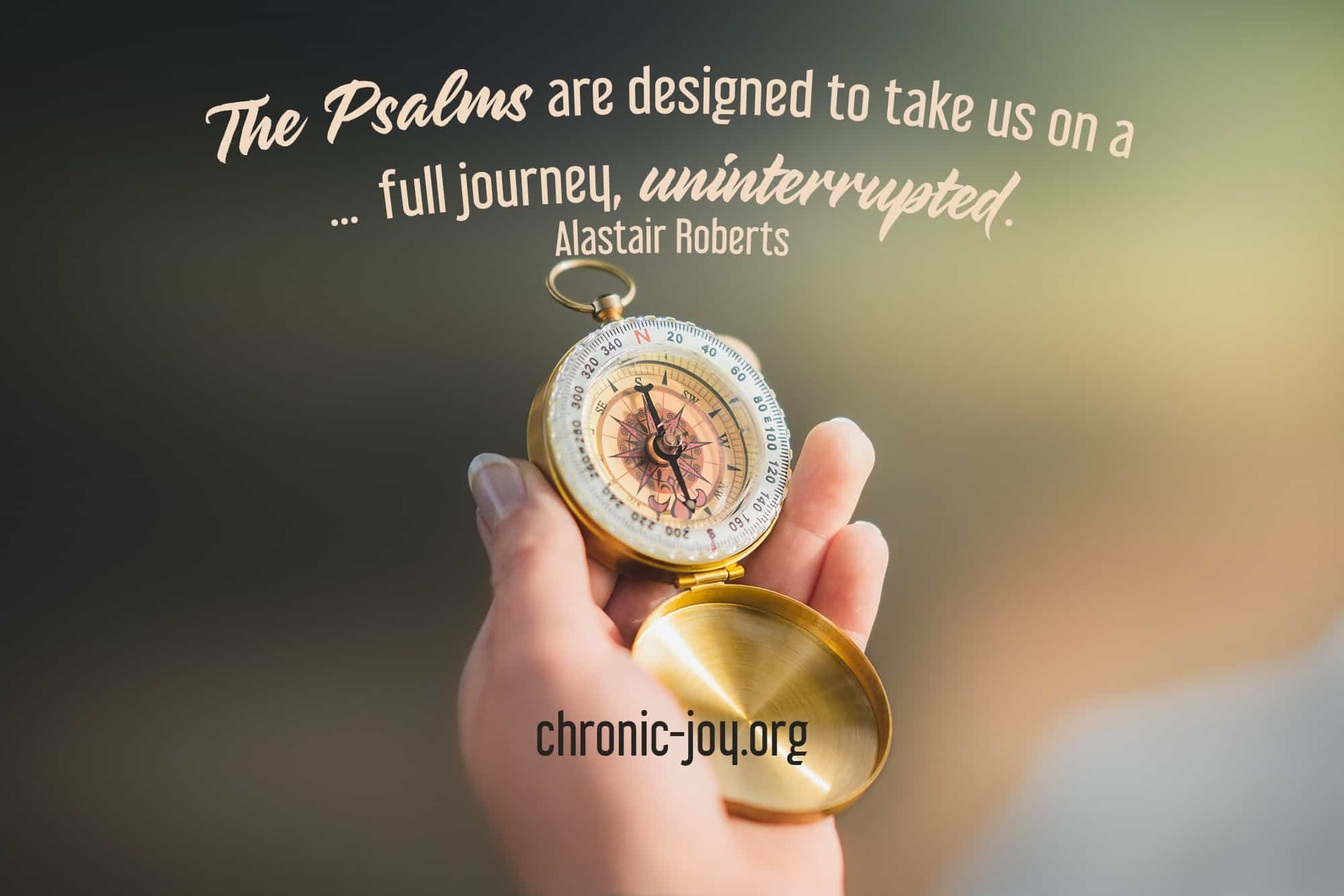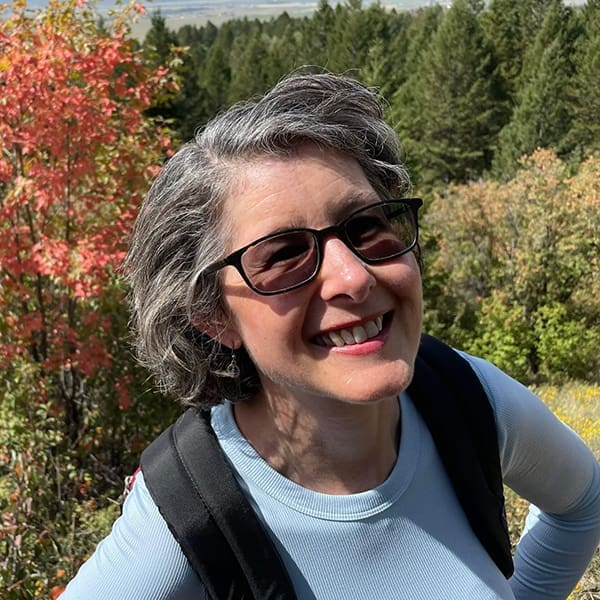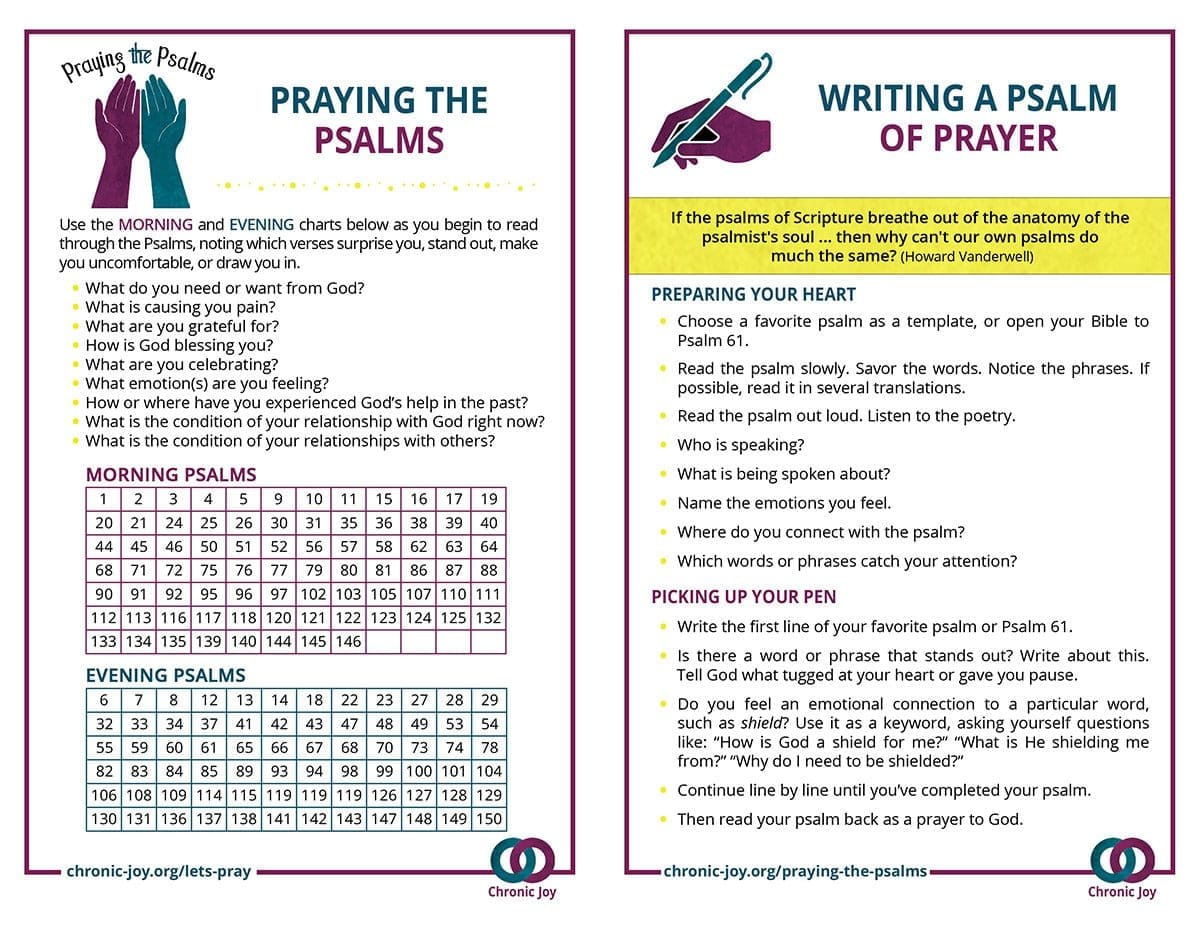
WHOLE PSALMS … A FULL ITINERARY
“The Bible’s okay until you start reading the psalms and then it really wigs out.” Rich Mullins
In August’s prompt, Poetry for Illness, I mentioned that I love the Psalms. Since then I came across this video from Theopolois Institute about praying (and singing) each psalm in its entirety—not just the parts you like.
WHOLE PSALMS NOT SLICE AND DICE
Alastair Roberts says, “The Psalms are designed to take us on a full itinerary … As we preserve the integrity of each Psalm, we are enabled to undertake that full journey, uninterrupted. Not just the bouncy hook but the entire movement.”
He compares slicing and dicing the Psalms to only singing the chorus of your favorite song. Or zeroing in on an especially moving section. Doing so deprives us of the full emotional journey possible when we experience the whole text.
That would be like skipping the first three minutes of Phil Collins’ old hit “In The Air Tonight.” Those of you old enough to know the song know that Collins, who played drums for the band Genesis before striking out on his own, waits a looooong time to introduce the drums in this song, more than three minutes. During that extra-long opening, Collins sings that he can hear something calling, and he’s been waiting for it for all his life.
We listen. We wait. And when the percussion payoff comes, it’s all the sweeter for having been taken on this journey. Sure, we could skip to the drums. But the song isn’t the same without the longing that precedes it.
WHOLE PSALMS NOT ALWAYS COMFORTABLE
And if every Psalm moved in that direction — from longing to payoff — we’d find them all much more fulfilling. But sometimes they “wig out,” as singer-songwriter Rich Mullins said. There are people who don’t like the Psalms, and for good reason. Some parts are, at the least, uncomfortable, and at the worst, deplorable. Some end with prayers for vengeance or advocate violence.
Let’s take the last six verses of Psalm 139. Verse 23 is surely in the Psalms Greatest Hits compilation. But look at what comes right before:
If only you, God, would slay the wicked!
Away from me, you who are bloodthirsty!
They speak of you with evil intent;
your adversaries misuse your name.
Do I not hate those who hate you, Lord,
and abhor those who are in rebellion against you?
I have nothing but hatred for them;
I count them my enemies.
What do you do with these parts of the Psalms?
What do you do with the parts of yourself that you despise?
Bring them to the Lord.
I don’t know what the psalmist had in mind when he wrote Psalm 139, but I know that sometimes the emotions I’ve expressed in prayer are downright ugly (as my grandmother would say). I have followed praise with loathing with petition. Sometimes I’ve started a prayer full of sound and fury and ended it in a worshipful place. Just not every time.
WHOLE PSALMS • A FULL JOURNEY
That’s why the Psalms are my all-time favorite poems. They don’t only include the must-see, Trip-Advisor-approved spots, but also the lonely highways, the construction detours, the hail in the night. The full itinerary.
TRY IT
Let’s treat the Psalms as poetry. Some of it is sound from the first note to the last, some have verses with a bouncy hook, and some sections should probably not be spoken aloud in polite company.
- Pick a Psalm (especially one with parts that bother you) and journal about it.
-
- Read the psalm.
- Jot down what you notice, what you like, what you don’t, what questions you have, and at least one way in which it speaks to your soul.
- Read the Psalm again, aloud (if you didn’t the first time). What emotions are being expressed? When have you felt those same feelings?
2. Write your own psalm-poem to God and cover the same emotional territory as the one you chose. You can go verse by verse and put the Psalm in your own words or use it as a springboard to write what you need to say. Don’t rush to the drum solo — take the full journey.
Here is an example I wrote a few years ago, putting Psalm 139 in my own words.
Psalm 139
Lord, You know me up and down
inside and out
left and right
evening and morning
before I speak or write you know what I’m going to say
(my own words surprise me, leaping out of my pencil)
I can’t possibly get away from You
from the sheepfield to the battlefield.
from my mother’s house to the queen’s house
and one day, to Your own glorious House
everything You made is wonderful – even me
You see my secrets places before they are revealed
You know how many days I still have
each one, an entry in your calendar
a poem in Your psalter
If I tried to count Your thoughts
I might as well stay up all night
counting slivers of salt or grains of sand
when I woke up I’d still be counting
and You’d still be with me
Oh God, I’m so tired of counting
my problems, my worries, these enemies I never wanted
Can’t you get rid of them for me?
I’m so tired of the lies, the anger, the unwarranted attacks
I find myself hating people you formed, fearfully and wonderfully
Wait. What am I saying?
I know you don’t want me to talk that way
or even think like that
Clean my heart
Clear my head
Show me Your forever way


Megan Willome
Chronic Joy® Contributing Writer
Megan is an editor at TS Poetry Press as well as the author of The Joy of Poetry and Rainbow Crow, a new picture book of poems written for children. Her day is incomplete without poetry, tea, and a walk in the dark.

Praying & Writing the Psalms
What is your favorite Psalm? Why? When did you choose it? What was happening in your life at the time? Have you ever considered writing your own psalm?

Recent Comments